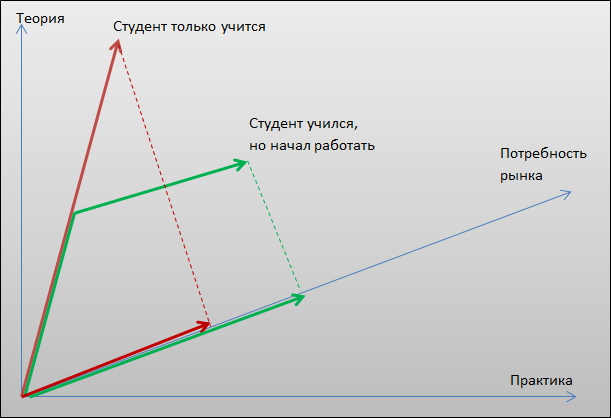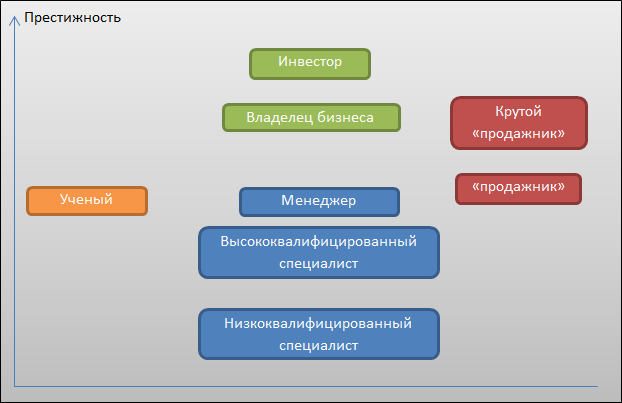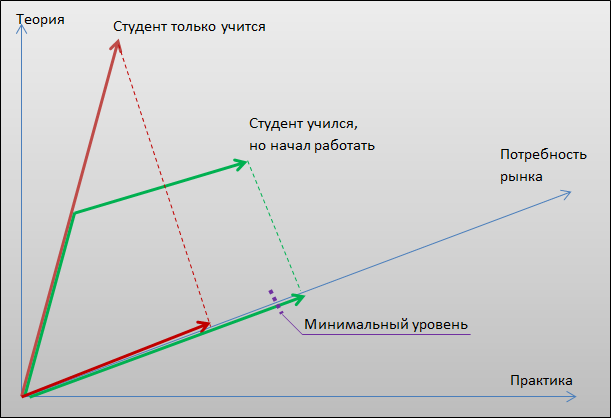Cadres decide everything

To study or not to study? - that's the question.
Oddly enough, the answer to it depends on your personal view of the economy. I do not pretend to be the ultimate truth, I just wanted to figure it out and bring some clarity.
1 The basics of economics
Market economy
The market economy is represented by thousands of companies that compete with each other. Companies are born, live short lives and die. In the first year, ¾ of all companies go bankrupt. For the first 5 years - 90-95%. The largest companies (from the Dow Jones list) live for 40-50 years.
The market situation is constantly changing. Therefore, in a market economy, companies need to respond very quickly to any changes in order to survive. There is an opportunity to reduce costs - reduce costs, otherwise a competitor will do it, and you will fly out of business (the company will go bankrupt).
If the company has fewer employees than it needs to serve the needs of customers - it doesn’t receive profit. If more - incurs extra costs. Any company should strive to ensure that its functions are performed by a minimum number of employees. With maximum efficiency.
Therefore, companies prefer to hire highly specialized employees. It’s more efficient. In other words, in a market economy, the need for highly skilled, highly specialized employees is very high .
Moreover, mid-sized companies usually cannot afford to train employees. Firstly, you can’t attach an employee to a company: the company will train him, and he will leave to work for competitors. Secondly, if the average life time of a company is 5-10 years, then long-term investments (such as training) are not beneficial for it. Although the larger the company, the more profitable it is to do it.
Soviet planned economy
From the point of view of a market economy, the “Soviet planned economy” is most like one giant corporation. One mega-corporation owns all the enterprises in the market, all employees work for it.
But the larger the company, the greater the bureaucracy. And the "largest company" should have the largest bureaucracy. Um. Perhaps it was.
Narrow specialists are no longer a necessity - the company is not fighting for its survival. Moreover, specialists of a wide profile are more profitable in the long term, but preparing them is long and expensive.
But, such a mega-company can afford to make long-term investments: to train wide-profile employees for their needs. This is a big plus. Another economy, other requirements.
2 Table of grades
If you ask who is better to work as a janitor or a director, you will most likely answer as a director. The answer seems to be obvious, right? Salary, working conditions, prestige.
But if you ask who is better to work as a clerk in a bank or a clerk in the mail, then almost everyone will answer - in a bank. Salaries and working conditions seem to be the same. The bank can be even worse. So why? Kudos! The clerk at the bank - it sounds almost like a banker!
Planned Economy
In the union, the idea of the prestige of professions was something like this:

Market economy
In a market economy, the situation is slightly different. Because the whole economy is made up of competing companies, then the person who owns their company is on the top rung. There are really more investors - people who, directly or through investment funds, own shares in dozens of companies. The alignment of preferences for professions here is approximately the following: It is

immediately evident that a scientist is no longer considered such a prestigious specialty. This is achieved due to two things:
1 There is no “crown” that scientists are used to wearing with us. No more divisions for candidate, doctor and academician. Just PhD and all.
2 The role of businessmen and sales people is increasing. A market economy means not just competition, but very strong competition. The business owner determines his strategy in the market, and salespeople are the “troops” of the business. All other employees are support troops.
Most successful students in the US dream of starting their own company (becoming businessmen), rather than “going to science.” Why? A business owner is like an army general. And, as you know, a soldier should dream of becoming a general, and not work in the engineering troops.
3 Education
Planned Economy
If the question “how many years did higher education last in the union”, you answer “5 years”, then this answer is not entirely correct. Education lasted, in fact, 8 years. Of which 5 years is theoretical training, and another 3 years is practice - distribution work. A person who has been unlearned for 5 years, really could (and can) do very little. By the way, this is clearly seen in the example of doctors who must undergo a long-term internship - they gain real experience.
Moreover, 5 years of study were also not equivalent. Usually in the first three years they read basic sciences, and the remaining two specialize - they read more practical subjects.
Market economy
With the transition to a market economy, two blows were dealt to our education. Even three.
Impact 1 - 3 years of distribution work were canceled.
It seems to be a good thing, but now graduates can not gain experience in the state. companies, and private enterprises (which work in a market economy) employees who do not know how are not needed. From them only losses.
It is from here that the legs grow in the situation “They don’t take for work - there is no experience, but there is no experience, because they don’t take to work. ”
Why private companies do not take such graduates? Imagine that a student of a medical school did not go through an internship. Does anyone want to be treated with him? Not? Then which hospital would like to hire him?
They wanted the best, but it turned out - as always.
Beat 2 - transition to the Bologna system.
Again, switching to international standards is a good thing. But how was it made? It was training for 5 years, dropped last year and received a bachelor's degree. But the last two years - this is just a specialization! Those. It used to be 3 years of basic sciences and 2 years of specialization. Now 3 years of basic sciences and 1 year of specialization.
Now, graduates have not only no practice, but also theory. Some fundamental knowledge. And no student knows how to apply them in real life. And she doesn’t even know.
They took a year, but added two! Yes, but this is a magistracy. They go there to do science. Those. there is, of course, no practice and / or specialization. And not foreseen.
Beat 3 - orientation to the labor market.
Universities are the only organizations that are engaged in the preparation of highly qualified personnel for the economy at the expense of the state. Those. our taxes with you.
But for some reason, they are preparing scientists instead. The department graduates from the department.
Not a single university will say that its task is to graduate highly qualified specialists in demand on the labor market. Most often in response you will hear “to educate”, “to comprehensively educate”, “to teach to think”.
4 Science
Market economy
In a market economy, science is funded by ... companies! All large companies have research centers (R&D) that are engaged in the development of technologies / products that will give this company an advantage in the global market.
Again. The company finances applied research, which should give it an advantage in the market, which will bring profit and cover research costs.
Sometimes institutes are hired for this, scientists are involved, grants are allocated. But always with the goal of recapturing the money. A company that spends more than it earns — goes bankrupt — is the law of the economy.
The state, in turn, finances basic research in order to expand the boundaries of applied research.
Even military developments find commercial use to recoup costs.
In a market economy, scientists are making sure that their discovery gets practical application. This is easiest to do when you conduct research on order - i.e. according to the principle of "demand creates supply."
From the point of view of a market economy, the scientist who made the discovery and printed the article is like a startup who came up with a brilliant idea. Both still have to create a prototype, test it, receive investments, deepen research and development, create a company, and enter the world market.
Planned Economy
From this point of view, our science has not changed much, and now it very much resembles the science of the planned economy.
Scientists do not do research that businesses need, but do what they are interested in. Just like in a joke about a man who searches for a wallet at night not where he lost it (and where you can probably find it), but where it is light.
Why are scientists in the West doing applied research for business needs? Because the only alternative to this is running after the business so that it implements your developments. For this, a scientist needs to be primarily an entrepreneur, understand the needs of the business, and then conduct research. It's complicated.
Our scientists do not even try to solve the problem - they simply ignore it. The state must finance science. And scientists should print articles. Based on the most worthwhile of them, foreign scientists will improve their applied developments and foreign companies will receive additional specific advantages over ours.
In a planned economy, no one required to implement scientific developments. And in a market economy, such scientists are likened to startups who come up with an idea, publish its business plan, and that’s it. Sitting and waiting for income. Or more funding.
If the founders of Google had finished all the work with the publication of the article “Page Rank is the future of search,” Google would never have existed. And its founders would never become billionaires.
So, our beloved scientists, maybe where you finish your work, the real work of the Scientist is just beginning?
5 Statistics
A few facts and statistics:
1 Russia ranks first in the world in the number of people with higher education ( proof ).
2 60% of people do not work in their specialty ( proof )
3 Scientists - a lot ( proof ).
4 The average salary of a scientist is $ 640 ( proof )
5 There are not enough highly qualified personnel ( proof ).
6 The most acute problem of Russian business is the lack of qualified personnel ( proof ).
7 There are many universities, but there are not enough qualified personnel ( proof )
Makes you think, is it not?
6 Two paradigms of higher education
There are two paradigms of higher education. One, older - that it teaches life in general, provides tools for understanding the world. Another, more practical and more modern: it’s just a preparation for a certain profession. And which one do you stick to?
Classical higher education.
Previously, when most people were illiterate and worked with their hands, classical higher education provided a lot of advantages. The man was actually a cut above the rest. I saw a complete picture of the world, better understood what was happening, could relate the facts and draw conclusions.
Studying the works of ancient philosophers, writing essays, debates, ... Such an education first of all taught a person to think, analyze, draw conclusions. At the university, a person got access to knowledge - a world heritage, the best books and treatises.
Higher Professional Education
The world has changed. Manual labor is becoming more and more automated and the need for specialists in intellectual work is growing: translators, aircraft designers, marketers, business administrators, ... the
Internet provides access not only to all the knowledge of the world (!), But also allows you to find among them relevant and / or interesting to you . Moreover, Wikipedia provides knowledge in a structured and almost everything in the world.
Thanks to Indian films, the average person has learned more about life in India than for all the time spent in school. Nobody was in North Korea, it’s bad there, few people were in America, but it’s good there - the picture of the world is not the most ideal, but it is probably better than its absence.
Classical education no longer provides undeniable advantages and, like theology in the Middle Ages, is increasingly moving away from real life.
The ability to think is no longer a killer feature, but the same need as the ability to create a resume, find a job, ask for a raise, make and develop useful contacts, drive your own car and finances.
A graduate of a modern classical university is like a real cavalryman ... during the time of tank wedges and tactical nuclear weapons. And cool and helpless at the same time.
Cadres decide everything
Both employers and students perceive universities as a forge of personnel, which they are not formally, were not and do not want to be. On the other hand - where else to train highly qualified personnel?
To become a cool designer, architect or programmer, you need to learn this for years.
In the description of IT vacancies in the USA, Master / PhD is still written when really cool programmers are needed. The need for universities that would train cool specialists is growing even faster than the shortage of these specialists.
7 Goldrat's Theory of Constraints
There is such a smart man - Goldrat. He developed a "theory of constraints," which actually allows you to find a bottleneck in any system. It also gives recommendations for its elimination or for reasonable control.
So, when this theory was applied to manufacturing enterprises, it turned out that the stupidest thing an enterprise can do is do its job well. When an enterprise / plant only cares about the release of products, it brings the company that owns them only losses, and contributes to its ruin.
The more products the plant produces, the faster the company goes bankrupt. After all, products must not only be released, but also sold. Imagine you have a bakery that operates at 60% of its capacity and produces 60,000 loaves of bread per day. At the same time, they buy only 55,000 per day. What will happen when the plant releases 80,000 loaves? He will bring only losses!
If the product is manufactured, but not claimed, it is a loss.
Goldrat proposed that the enterprise not only produce a product, but produce and sell it. Then it is clear how much real benefit production brings.
Now let's look at our higher education. Universities graduate many graduates? Yes, Russia is on the 1st place in the world in the number of people with higher education. And in their specialty they go to work very little. Why?
They produce, but they cannot sell (get a job). There is no demand. They do not produce what is needed. And they don’t produce what they need.
If a university trained a person, and he worked in his specialty, say, for three years, then yes, this is a plus for the economy. And if the university graduated 100 lawyers, the third got a job as notary public assistants, and the rest as sales managers?
8 Students, you are doing everything right
Some students are looking for work from the 3rd year, and someone works even from the first. Does work harm learning? It depends on how much you work. If there is a lot, most likely you can devote only part of the time to study.
The planned economy (the situation through the eyes of teachers)
Each teacher is sure that the better the student learns, the more sought-after specialist he will become and the more success he will achieve. In their eyes, the situation looks something like this:

Market economy (situation through the eyes of employers)
In fact, from the point of view of employers and the labor market, the situation looks a little different.
Students who see the world as well as employers go to work to the detriment of their studies. They not only see that what they are teaching does not match the needs of the market, but they also notice a certain minimum level that is needed to become a sought-after specialist in the labor market. The minimum level of skills is not always pronounced, but almost always present.

“No experience - no one is hired, but no experience, because they don’t take to work ”- this is just about those graduates who have finished their studies, but experience does not reach the minimum that is demanded by the market.
Please note that from the point of view of teachers, there is no minimum level of skills and experience that are needed for employment. And from the point of view of the labor market, it is.
Sad but true
Our universities graduate people who do not know how to create a resume, pass interviews, demonstrate their best side, get a job, ask for a raise. Because in a planned economy, all this was not necessary. But after all, the planned economy and everything connected with it remained in the distant past. Or not?
PS
If you were interested, you can read my early articles on Habré, where I covered this topic from other angles:
- Life lesson
- Training for a Java programmer (last third)
